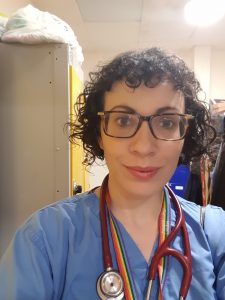by Dr Sonia Wolf, Department of Infectious Disease
In January 2020, talk of a new virus in Wuhan emerged. As whispers spread about what it was and where it had come from, my curiosity was only that of an interested PhD student in the Department of Infectious Disease. As the epidemic grew and spread, however, I became increasingly aware that, as a medical doctor, my skills on the frontline were going to be needed. As college shut down, my research samples sat sadly in the freezer, while I tried (and failed) to write from home. The email came at the end of March; I was going to Newham Hospital, as an Acute Medical Registrar.
It was a daunting redeployment for me. I had been out of clinical work for over 2 years; I had never worked at Newham, and this was not my usual specialty, Haematology. I went for training on how to use a ventilator. The hospital was eerily quiet; busy but calm, everyone transporting patients briskly from A&E to the wards, behind expressionless masked faces. I started on night shifts, covering the Care of the Elderly wards. I had never in my career seen anything like this. There were 9 wards, excluding Intensive Care, at Newham, and 8 and a half were filled with Covid patients. For most of the elderly, deemed too frail for Intensive Care, this was their only option. For many of them at that time, the only thing we could do was increase the oxygen to the maximum level, then watch to see if they made it through. Many did not.

In the doctors’ mess, doctors of all backgrounds and ages rested, chatted or ate midnight noodles, supplied by the canteen. Many of us had come from research, or non-acute specialties like HIV Medicine and Dermatology, and those who traditionally filled Acute Medicine roles helped support us as we adjusted to the circumstances.
After about two weeks I fell ill with Covid myself and spent two weeks recovering. When I returned, the usual diversity of hospital life was returning. Covid was still there; plenty of it, but now we had suicide attempts, alcohol withdrawal and late-presenting cancers. These were the unseen casualties of the pandemic. We also had to talk to each relative by phone every day, trying to pass news one way, and love, without sight or touch, the other.
I returned to my lab work in June. It was a relief but also sad to say goodbye to so many incredible colleagues, both old and new. I learned that I love clinical work, but the toll it took on us was huge. I hope what I did was able, in a small part, to buy some time, in order to allow the scientific community to continue their incredible efforts.